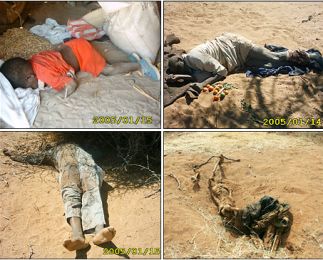The Secret Genocide Archive

By NICHOLAS D. KRISTOF, The New York Times
Feb 23, 2005 — Photos don’t normally appear on this page. But it’s time for all of us to look squarely at the victims of our indifference.
These are just four photos in a secret archive of thousands of photos and reports that document the genocide under way in Darfur. The materials were gathered by African Union monitors, who are just about the only people able to travel widely in that part of Sudan.
This African Union archive is classified, but it was shared with me by someone who believes that Americans will be stirred if they can see the consequences of their complacency.
The photo at the upper left was taken in the village of Hamada on Jan. 15, right after a Sudanese government-backed militia, the janjaweed, attacked it and killed 107 people. One of them was this little boy. I’m not showing the photo of his older brother, about 5 years old, who lay beside him because the brother had been beaten so badly that nothing was left of his face. And alongside the two boys was the corpse of their mother.
The photo to the right shows the corpse of a man with an injured leg who was apparently unable to run away when the janjaweed militia attacked.
At the lower left is a man who fled barefoot and almost made it to this bush before he was shot dead.
Last is the skeleton of a man or woman whose wrists are still bound. The attackers pulled the person’s clothes down to the knees, presumably so the victim could be sexually abused before being killed. If the victim was a man, he was probably castrated; if a woman, she was probably raped.
There are thousands more of these photos. Many of them show attacks on children and are too horrific for a newspaper.
One wrenching photo in the archive shows the manacled hands of a teenager from the girls’ school in Suleia who was burned alive. It’s been common for the Sudanese militias to gang-rape teenage girls and then mutilate or kill them.
Another photo shows the body of a young girl, perhaps 10 years old, staring up from the ground where she was killed. Still another shows a man who was castrated and shot in the head.
This archive, including scores of reports by the monitors on the scene, underscores that this slaughter is waged by and with the support of the Sudanese government as it tries to clear the area of non-Arabs. Many of the photos show men in Sudanese Army uniforms pillaging and burning African villages. I hope the African Union will open its archive to demonstrate publicly just what is going on in Darfur.
The archive also includes an extraordinary document seized from a janjaweed official that apparently outlines genocidal policies. Dated last August, the document calls for the “execution of all directives from the president of the republic” and is directed to regional commanders and security officials.
“Change the demography of Darfur and make it void of African tribes,” the document urges. It encourages “killing, burning villages and farms, terrorizing people, confiscating property from members of African tribes and forcing them from Darfur.”
It’s worth being skeptical of any document because forgeries are possible. But the African Union believes this document to be authentic. I also consulted a variety of experts on Sudan and shared it with some of them, and the consensus was that it appears to be real.
Certainly there’s no doubt about the slaughter, although the numbers are fuzzy. A figure of 70,000 is sometimes stated as an estimated death toll, but that is simply a U.N. estimate for the deaths in one seven-month period from nonviolent causes. It’s hard to know the total mortality over two years of genocide, partly because the Sudanese government is blocking a U.N. team from going to Darfur and making such an estimate. But independent estimates exceed 220,000 – and the number is rising by about 10,000 per month.
So what can stop this genocide? At one level the answer is technical: sanctions against Sudan, a no-fly zone, a freeze of Sudanese officials’ assets, prosecution of the killers by the International Criminal Court, a team effort by African and Arab countries to pressure Sudan, and an international force of African troops with financing and logistical support from the West.
But that’s the narrow answer. What will really stop this genocide is indignation. Senator Paul Simon, who died in 2003, said after the Rwandan genocide, “If every member of the House and Senate had received 100 letters from people back home saying we have to do something about Rwanda, when the crisis was first developing, then I think the response would have been different.”
The same is true this time. Web sites like www.darfurgenocide.org and www.savedarfur.org are trying to galvanize Americans, but the response has been pathetic.
I’m sorry for inflicting these horrific photos on you. But the real obscenity isn’t in printing pictures of dead babies – it’s in our passivity, which allows these people to be slaughtered.
During past genocides against Armenians, Jews and Cambodians, it was possible to claim that we didn’t fully know what was going on. This time, President Bush, Congress and the European Parliament have already declared genocide to be under way. And we have photos.
This time, we have no excuse.
